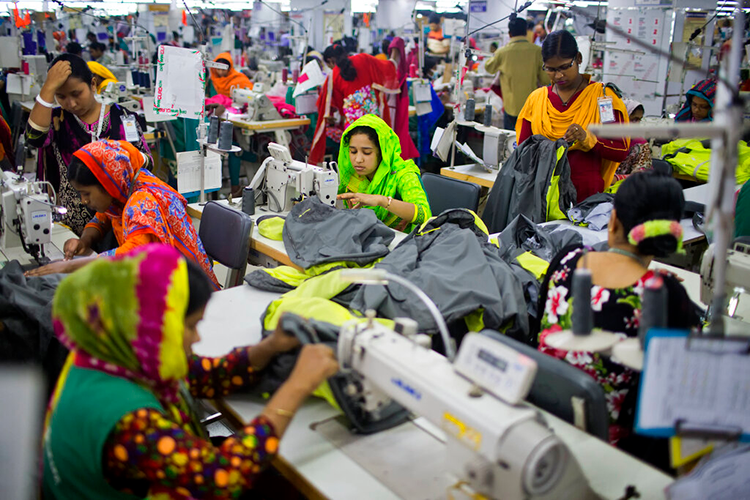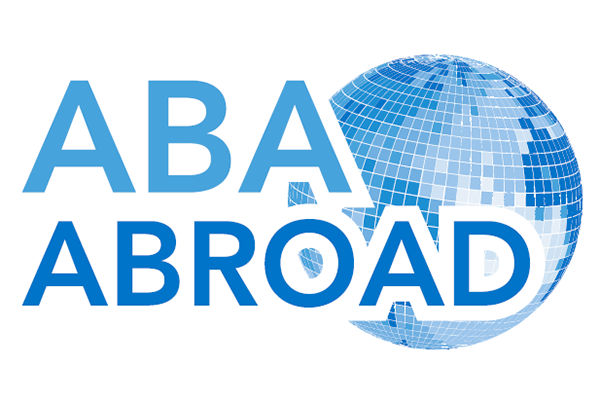Advocating for human rights for workers around the world is part of the ABA's mission

Bangladeshi garment workers are still fighting for protections eight years after the collapse of an eight-story building in Rana Plaza killed more than 3,600 workers. (AP Photo/A.M. Ahad, File)
Next time you put on that top fashion-brand garment made in Bangladesh, consider the workers who produced it. Are they still alive, despite wages below poverty level and unsafe working conditions? Or have some been killed or injured in a factory collapse or fire, or in an attempt to strike for better working conditions and wages? Have their employers or the government filed unfounded criminal charges against them for daring to negotiate at the bargaining table?
Despite a groundswell of international support for labor reforms after the 2013 collapse of the Rana Plaza factory building in Bangladesh that killed or injured more than 3,600 workers, repression against workers who advocate for better terms and conditions of work in the world’s second-largest garment manufacturing export sector has not improved. A recent international complaint by global union leaders against Bangladesh documents the ongoing violence and criminalization against union and worker rights advocates in the country.
Bangladesh offers a telling example of the rising impunity for attacks on workers’ rights advocates around the world. These attacks have implications far beyond labor disputes—the right to organize and associate is a means to not only promote workers’ rights but also to encourage public participation in democratic processes.
Now the right to freedom of association is increasingly under threat. Rising authoritarianism has led to the adoption of laws restricting this fundamental right, increasing attacks on judicial independence, and chilling the peaceful exercise of freedom of association and assembly, according to a report by Freedom House. Sadly, the COVID-19 pandemic has served as a pretext to further restrict civic space and freedoms and claw back long-standing labor law protections.
Common tactics are used against advocates
Criminal harassment is a powerful tactic used to intimidate and silence unions and other workers’ rights advocates. A recently released survey by the International Trade Union Confederation shows that nearly 70 countries resort to such practices and the climate of impunity is spreading. Countries that arrest and detain workers for exercising their freedom of association have risen from 25% in 2014 to more than 45% in 2021, and those that criminalize the right to strike have risen from 63% in 2014 to 87% in 2021.

While blatant criminalization of protected activities is not new, an upswing in more complex prosecutions without substantial evidence avoids overt criminalization of legally protected activities. The wide range of reported criminal charges now include disturbance of public order, threats to public health, incitement to discord, damage to property, tax fraud, defamation and criminal penalties for insulting the nation’s leaders or lèse majesté (insulting royal authority), cybercrime, terrorism and extremism. In some cases, trumped-up charges were imposed or threatened against family members, according to the 2020 Global Rights Index.
Perpetrators are avoiding accountability. Serious cases go unreported due to the lack of documentary evidence of official abuse. In a “catch and release” pattern, public authorities arrest, detain and then release their victims without charge, which chills advocacy and organizing efforts. In other cases, prosecutors impose charges, some initiated by business complainants, but then fail to pursue prosecution, subjecting defendants to reputational damage and personal harm in many cases, as well as court-ordered hearings that interrupt trade union work. This can be seen through the experiences of Bangladeshi garment worker union leaders.
 Yanur Islam, a garment worker who was injured in the collapse of the Rana Plaza in Bangladesh in 2013, poses with her child at the site during the eighth anniversary of the disaster. (Photo by Piyas Biswas / SOPA Images/Sipa USA via AP Images)
Yanur Islam, a garment worker who was injured in the collapse of the Rana Plaza in Bangladesh in 2013, poses with her child at the site during the eighth anniversary of the disaster. (Photo by Piyas Biswas / SOPA Images/Sipa USA via AP Images)At a collective level, the acts violate internationally recognized rights of a trade union to be free from interference with its establishment, administration, organizing, and resources.
Tackling impunity
Promoting the rule of law and accountability for rights violations is part of the mission of the American Bar Association. The ABA works against criminal harassment of union and worker rights by contributing legal expertise to support labor and related advocacy organizations to combat impunity in country and in international forums.
To date, the Justice Defenders Program of the ABA Center for Human Rights has intervened in 63 countries on behalf of about 1000 defenders facing attacks from unjust criminal laws or legal process, including unionists, environmental activists, journalists and indigenous peoples. In response to requests from workers’ rights groups, CHR has supported trade unions and their members and other advocates facing arrest, detention and prosecution on unfounded criminal allegations and strengthened local efforts for reforms in law and practice.
Through its trial monitoring program in coordination with the TrialWatch Initiative, the CHR provides credible and independent accounts of criminal proceedings to buttress the reports of union and worker rights activists and NGOs. The program has recently documented the violation of fair trial rights and other human rights of union activists in Bangladesh, Cambodia, Ecuador and Zimbabwe. By exposing patterns such as “catch and release” and the lack of independence of the judiciary, prosecutors and law enforcement, the ABA reports provided valuable perspectives for policymakers.
ABA pro bono networks work behind the scenes to support local defense lawyers or to make direct contacts with authorities in cases of unionists facing spurious charges. They also support local efforts for reform of ambiguous or unjust criminal laws. In Eswatini, for example, the ABA provided a legal analysis of amendments needed to a bill on the exercise of freedom of association, assembly and expression. The bill later improved following a diplomatic initiative which built on ABA’s work.
CHR’s initiatives also expose laws and practices compromising the judicial system and leverage international support against abuse by the police and military. Recently, CHR exposed politically motivated disciplinary proceedings against an independent judge in Poland. It also conducted a joint fact-finding report with five regional and international bar associations and legal NGOs to assess threats to the independence of the legal profession in Tanzania and a resulting crackdown on the rule of law, democracy and human rights.
Building accountability through international legal and political action
CHR contributes to the work of international, regional and multilateral organizations that operate treaty-based and soft law mechanisms to hold states and businesses accountable for criminal harassment and related violations. At the International Labour Organization (ILO), CHR has provided behind-the-scenes support to labor organizations with standing as ILO constituents to participate directly in ILO’s case-based and country-reporting mechanisms. CHR staff and pro bono lawyers have helped to document and prepare complaints against restrictions on freedom of association to ILO complaints mechanisms and comments on country situations for the ILO bodies supervising states’ application of ILO Conventions.
In the UN and Inter-American human rights systems, CHR coordinates with labor and related organizations to bring criminal harassment cases and country situations to the attention of special procedures and human rights treaty bodies. With the CHR’s drafting support, the UN Special Rapporteur on the rights to freedom of peaceful association and assembly and association released a resource handbook on litigation and advocacy. Last year, ABA filed a written submission involving a detained human rights lawyer in Tanzania before the UN Working Group on Arbitrary Detention, calling for his release and reparation as well as reform to the country’s law and practice to conform with its international obligations.
Leveraging trade arrangements that require respect for freedom of association can also call governments and business to account for criminalization practices. Last year, CHR’s work on criminalization of labor activists in Cambodia contributed to the European Commission’s decision to temporarily withdraw Cambodia’s eligibility for trade preferences on certain products until the government made progress in protecting political participation and freedoms of expression, association, and assembly.
Combatting criminal harassment against trade unions and other advocates around the world calls for enhanced coordination between the labor and human rights communities to promote accountability. Working together, the two sectors can spotlight countries with a persistent record of noncompliance with the recommendations of the ILO and the UN.
For example, delivering technical assistance to labor ministries can be effective only where criminal justice systems no longer operate as a means for business reprisals. Human rights fact-finding and trial observations undertaken by pro bono ABA lawyers document misconduct by justice sector personnel and foreign investors that highlights the need for interventions beyond technical assistance. In countries where misconduct involves intentional government corruption rather than lack of capacity, these ABA reports gather public opinion in support of investor and consumer action and justify government sanctions or home-state regulation of abusive enterprise activities.
As voters, consumers and citizens, we must do our part to hold governments and businesses accountable for any attacks against labor rights activists and restrictions to organize and take collective action.

Brittany Benowitz has worked as the director of the ABA Center for Human Right’s Justice Defenders program since 2011. Previously, she was a defense adviser to a senior member of the Senate Foreign Relations Committee for four years. In that capacity, she conducted oversight of operations in Iraq and Afghanistan and monitored U.S. counterterrorism, foreign assistance, arms control and security sector reform policies. She has worked on litigation in civil and criminal courts in the United States and abroad and conducted human rights investigations in Latin America, Eastern Europe and South Asia. She received her JD from the American University Washington College of Law.

Janelle M. Diller is a consultant with the ABA Center for Human Rights and Senior Research Associate with the Global Governance Center of the Geneva Graduate Institute for International and Development Studies. She served as legal counsel to the International Labour Organization where she played a major role in developing international instruments, inter-institutional agreements, and multi-stakeholder accords such as the Rana Plaza Arrangement. She was previously legal director of the International Human Rights Law Group in Washington, D.C. Diller has served as Fulbright Research Chair in Human Rights and Social Justice at the University of Ottawa (2019-20), Max Planck Scholar at the Max Planck Institute for Comparative Public Law and International Law in Heidelberg (2018) and Paul Martin Sr. Professor of International Affairs and Law at the University of Windsor Faculty of Law (2016). Her book, Securing Dignity and Freedom through Human Rights (Brill, 2012), which explains the origin and logic of economic, social, and cultural rights, was designated as a UN Research Guide to the Universal Declaration of Human Rights. Diller holds a JD (Georgetown) and an MA in journalism (Syracuse).
The materials contained herein represent the opinions of the authors and editors and should not be construed to be those of either the American Bar Association or Section unless adopted pursuant to the bylaws of the Association. Nothing contained herein is to be considered as the rendering of legal advice for specific cases, and readers are responsible for obtaining such advice from their own legal counsel. These materials and any forms and agreements herein are intended for educational and informational purposes only.
This column reflects the opinions of the author and not necessarily the views of the ABA Journal—or the American Bar Association.



